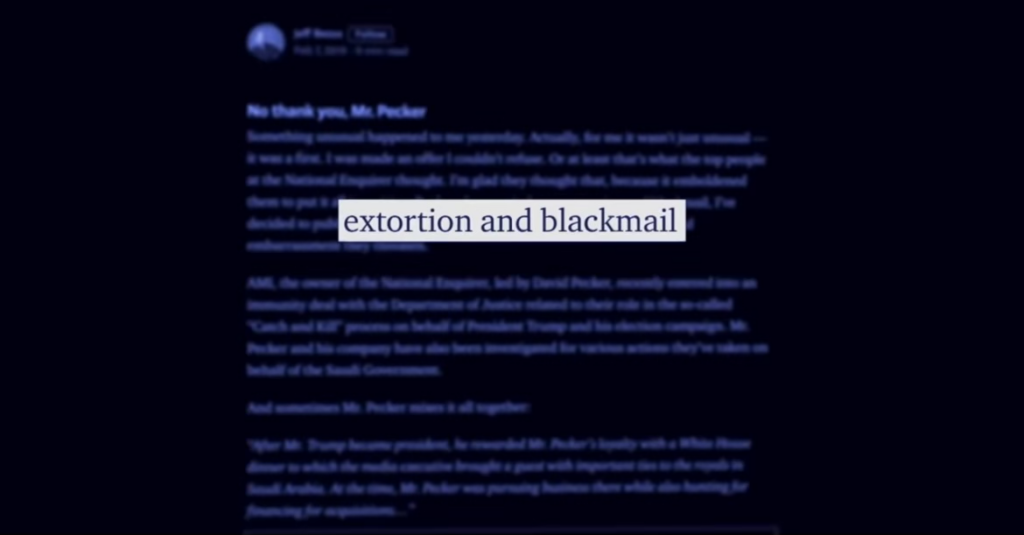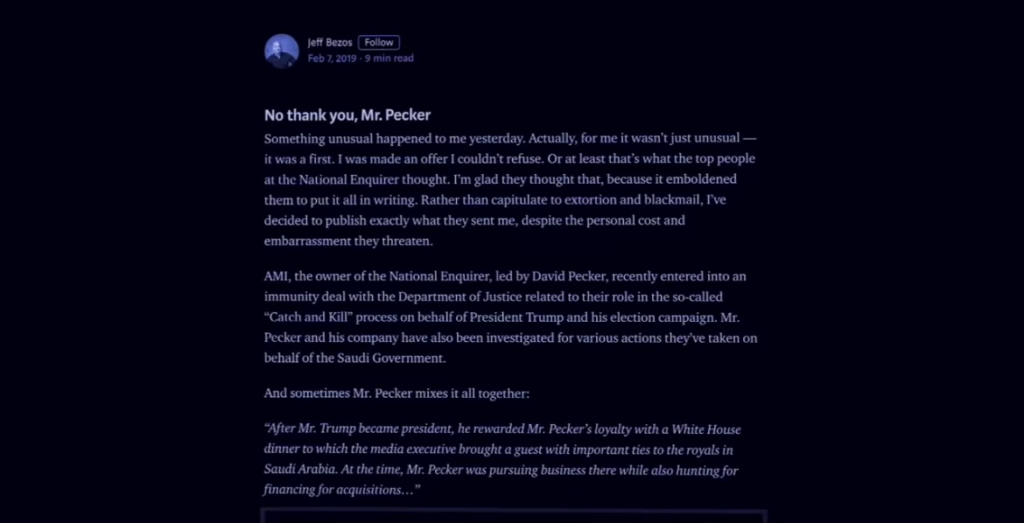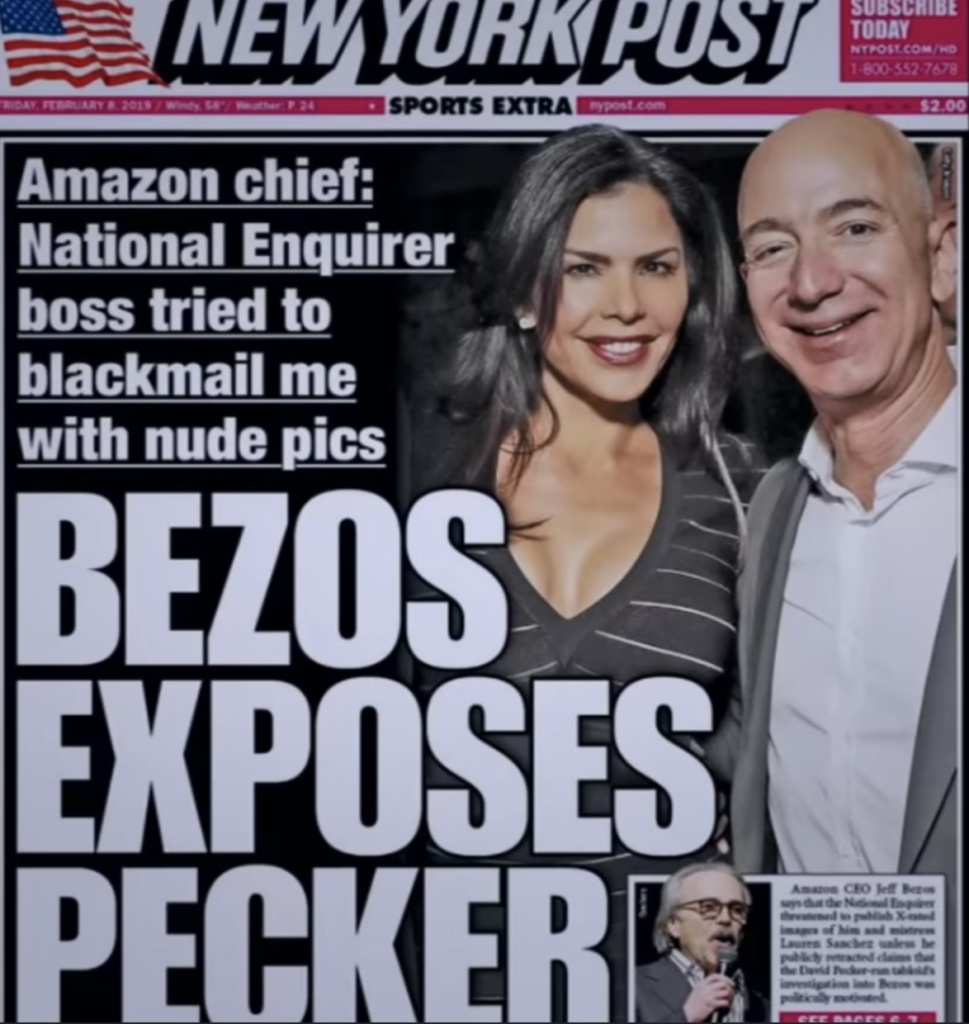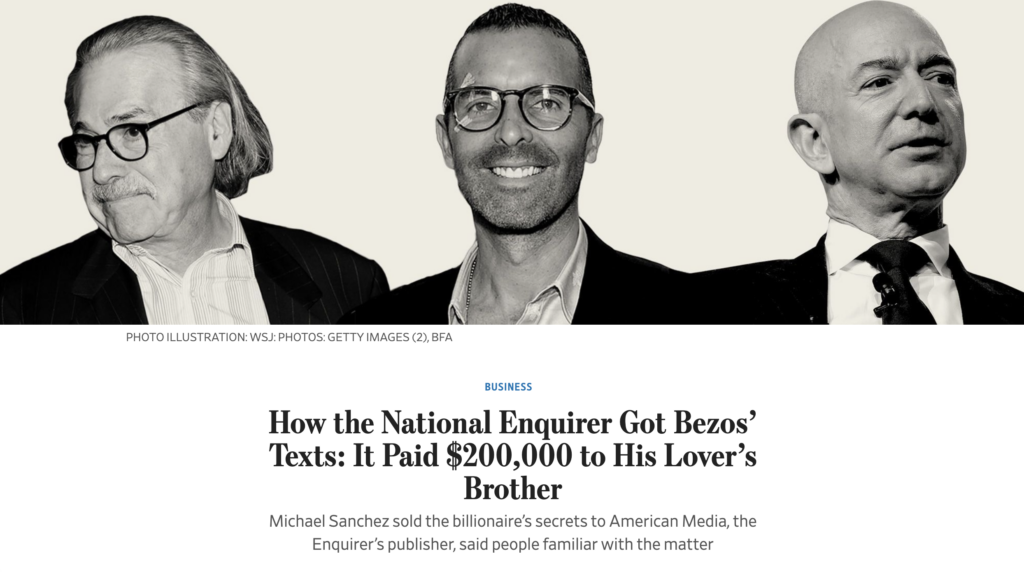In 2019, Jeff Bezos, Amazon CEO and owner of The Washington Post, found himself at the center of a scandal that blurred the lines between personal drama, media ethics, and political influence. What began as tabloid fodder escalated into a high-stakes battle that reshaped conversations about power dynamics, media integrity, and the art of crisis management.
The Scandal in Focus
The controversy erupted when The National Enquirer meticulously pieced together details of Bezos’ extramarital affair with former news anchor Lauren Sanchez. Over the course of their investigation, the tabloid tracked Bezos across five states and 40,000 miles, compiling a damning exposé that coincided with Bezos’ announcement of his divorce from MacKenzie Scott, his wife of 25 years.
What made this story more than a mere tabloid headline was Bezos’ belief that the coverage wasn’t just about his personal life—it was politically motivated. As the owner of The Washington Post, Bezos had frequently clashed with two powerful figures:
- President Donald Trump, who had a history of disparaging The Washington Post for its critical coverage of his administration, often tying it to Bezos and Amazon.
- Saudi Crown Prince Mohammad bin Salman, implicated in the CIA’s findings for orchestrating the murder of journalist Jamal Khashoggi, a regular contributor to the Post.
The controversy deepened when Bezos alleged that David Pecker, the CEO of The National Enquirer’s parent company, AMI, had close ties to both Trump and the Saudi Crown Prince. These connections, Bezos claimed, were pivotal in the tabloid’s relentless pursuit of his private life.

The Extortion Attempt
The scandal took a darker turn when The National Enquirer approached Bezos with an ultimatum. David Pecker, leveraging intimate photos of Bezos and Sanchez, demanded that Bezos publicly declare The Enquirer’s coverage was not politically motivated. Failure to comply, Pecker warned, would result in the publication of those private photos.
Faced with this extortion attempt, Bezos made a bold and unprecedented move. In a personal essay titled “No Thank You, Mr. Pecker,” Bezos exposed the blackmail attempt, revealing the emails and threats he had received.
“Rather than capitulate to extortion and blackmail, I’ve decided to publish exactly what they sent me, despite the personal cost and embarrassment they threaten.”
Bezos’ decision was a masterstroke of transparency and crisis management, fundamentally altering the dynamics of the situation.
Turning the Tables: A Masterclass in Crisis Management
Jeff Bezos’ response to the scandal has been hailed as one of the most effective crisis management strategies in recent history. Let’s examine the key elements that made his approach successful:
- Radical Transparency
Bezos’ decision to publicly share the extortion attempt dismantled The National Enquirer’s leverage. By revealing the very threats meant to embarrass him, Bezos turned the tables, earning widespread admiration for his honesty and courage. - Framing the Narrative
Rather than allowing the scandal to focus on his personal life, Bezos reframed the conversation. He cast himself as the victim of unethical media practices, shifting public attention to The Enquirer’s questionable motives and relationships with powerful figures. - Owning the Story
Bezos didn’t shy away from the humiliating details of the scandal. By taking control of the narrative, he neutralized the sensationalism surrounding the affair and reframed the issue on his own terms. - Highlighting Broader Issues
By shedding light on The National Enquirer’s alleged history of unethical journalism and its ties to politically powerful figures, Bezos successfully redirected the conversation to systemic concerns about media corruption and political influence.


The Fallout and Bezos’ Resilience
The personal toll of the scandal was immense. Bezos finalized his divorce from MacKenzie Scott with a record-breaking $38 billion settlement. Yet, professionally, Bezos emerged relatively unscathed. His decision to expose the extortion attempt garnered public support, painting him as a principled leader standing up against media misconduct.
However, the scrutiny on Bezos and Amazon didn’t subside. Critics seized the opportunity to amplify calls for corporate accountability, focusing on Amazon’s labor practices, tax policies, and monopolistic tendencies. While Bezos’ handling of the scandal bolstered his public image in the short term, it also highlighted the growing challenges associated with his vast wealth and influence.
Lessons in Crisis Management
Jeff Bezos’ handling of the National Enquirer scandal offers valuable lessons for leaders navigating public crises:
- Be Proactive, Not Reactive
By taking the initiative to disclose the extortion attempt, Bezos dictated the terms of the story, rather than reacting to it passively. - Maintain the Ethical High Ground
Refusing to succumb to blackmail demonstrated Bezos’ integrity and reinforced his credibility as a leader. - Leverage Transparency
Openly addressing the issue built public trust and allowed Bezos to control the narrative. - Reframe the Conversation
Redirecting attention to systemic issues minimized the personal fallout and turned the scandal into an opportunity for meaningful discourse.

Conclusion
Conclusion
What began as an intensely personal scandal for Jeff Bezos evolved into a pivotal moment that showcased his resilience and strategic brilliance. By refusing to be intimidated, Bezos emerged not only as a powerful business leader but also as a figure capable of turning adversity into an opportunity for growth and reform.
As The Wall Street Journal’s revelations about the $200,000 payment to Michael Sanchez illustrate, the scandal was layered with intrigue and complicity. Yet, Bezos’ response remains a benchmark for how transparency, courage, and strategic thinking can transform even the most challenging crises into defining moments.


